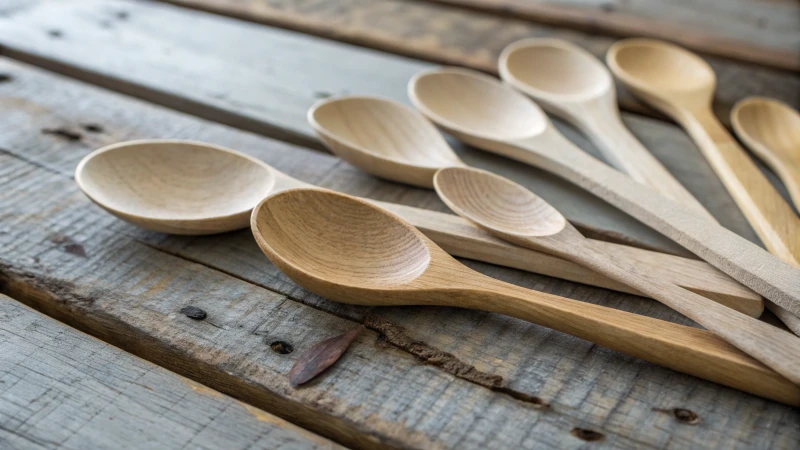
Do you ever wonder how the tools we use affect our planet?
Disposable wooden spoons offer a really eco-friendly choice instead of plastic utensils. They break down naturally. These spoons are strong. They are free from harmful chemicals like BPA. Wooden spoons work well for every occasion. Use them for casual gatherings or elegant events. They let people choose responsibly while they enjoy their food. Responsible choices matter.
I remember the first time I hosted a picnic. I realized I had forgotten to bring cutlery. That moment, I had an idea. I grabbed some wooden spoons instead of plastic ones. They looked rustic and charming. They also felt really good to use because they were eco-friendly. Wooden cutlery is an exciting world. Let's explore it together!
Wooden spoons are biodegradable and eco-friendly alternatives.True
Wooden spoons decompose naturally, making them a sustainable choice compared to plastic utensils, which contribute to pollution.
Plastic cutlery is more durable than wooden spoons.False
Plastic cutlery may be more durable in some cases, but wooden spoons offer sufficient strength for most dining needs while being eco-friendly.
Why Should I Choose Wooden Spoons Over Plastic Cutlery?
Do you ever think about how your kitchen tools affect the planet and your health? Wooden spoons might change your cooking. They might also transform your dining experience.
Wooden spoons offer many benefits compared to plastic cutlery. These advantages include being eco-friendly. Wooden spoons are durable. They are safe and free from harmful chemicals. They have antibacterial properties. Wooden spoons look beautiful. They provide a healthier option. Very important, they are also an environmentally responsible choice.
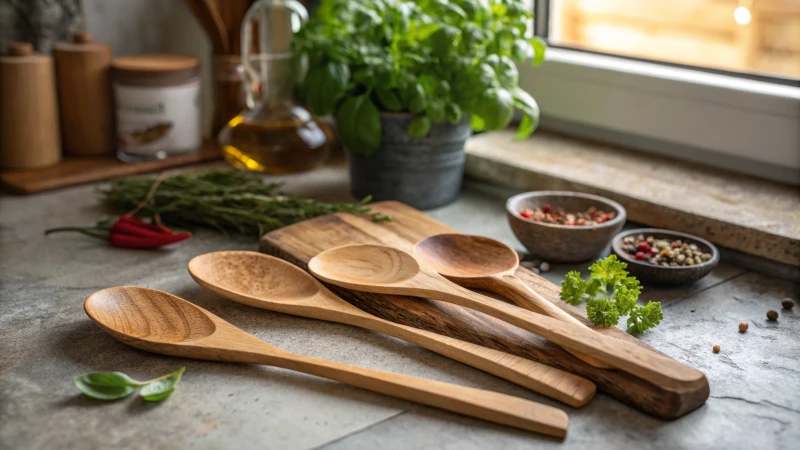
Eco-Friendliness of Wooden Spoons
When I first changed to wooden spoons, it seemed like a small shift. I did not realize how more than just a kitchen tool came into my life. Here’s why these spoons are now my top choice.
One of the most significant advantages of using wooden spoons is their eco-friendliness. Wooden cutlery, often made from renewable resources like birch or bamboo, is biodegradable and compostable. This means that when disposed of, they break down naturally without harming the environment, unlike plastic which can take hundreds of years to decompose. The shift to sustainable materials1 not only helps reduce landfill waste but also supports sustainable forestry practices.
Durability and Heat Resistance
I often depend on my sturdy wooden spoons while cooking. They are really durable compared to plastic ones. I've experienced this many times, especially when cooking hot chili. Unlike plastic, which warps or melts, wooden utensils resist high temperatures. This reliability comforts me during food preparation.
Here's a simple comparison:
| Feature | Wooden Spoons | Plastic Cutlery |
|---|---|---|
| Heat Resistance | Yes | No |
| Biodegradable | Yes | No |
| Durability | High | Low |
Safety and Non-Toxicity
Wooden spoons are also safe. They contain no harmful chemicals like BPA, often found in plastics. Cooking with wood means no risk of toxins entering my food. This is very reassuring, particularly when preparing meals for loved ones. Choosing healthier options brings such comfort and peace of mind. Learn more about health benefits2 related to wooden utensils.
Antibacterial Properties
Wood has natural antibacterial properties. I found this very surprising! Wooden spoons help stop bacteria growth and are more hygienic than plastic alternatives, which can harbor bacteria in scratches over time. Maintaining good kitchen hygiene matters, especially for someone who loves kitchen experiments like me.
Aesthetic Appeal
Wooden spoons have a special charm that adds rustic beauty to any dining setting. Imagine a lovely summer evening with friends at my table; those wooden spoons would surely stand out! The unique grain patterns and natural colors of wood enhance a meal’s visual appeal—whether at a wedding or a casual dinner—these spoons bring style. Investing in beautiful wooden cutlery3 truly makes a difference.
Conclusion (not applicable)
In conclusion, switching from plastic to wooden spoons was really rewarding for my kitchen journey. Their benefits cover health, environmental awareness and beauty; wooden spoons are my kitchen must-have for sure! Are you ready to switch too? Let’s enjoy a more sustainable and wonderful cooking experience together!
Wooden spoons are biodegradable and compostable.True
Unlike plastic cutlery, wooden spoons break down naturally, reducing landfill waste and supporting eco-friendliness.
Plastic cutlery is more durable than wooden spoons.False
This claim is false; wooden spoons are generally more durable and heat-resistant than plastic cutlery.
How can I find the best disposable wooden spoons for my needs?
Choosing good disposable wooden spoons feels overwhelming sometimes. Many options exist. No need to worry. I really want to share my experiences and insights on selecting the perfect option.
Choose high-quality disposable wooden spoons by looking for sustainably sourced materials. Birch and bamboo are good options. Check if the spoons are durable. They should not break easily. Compostability is also important. Non-toxic materials are crucial for safe food use. Safety matters. Search for certifications such as FSC. These labels are important. They show responsible sourcing.
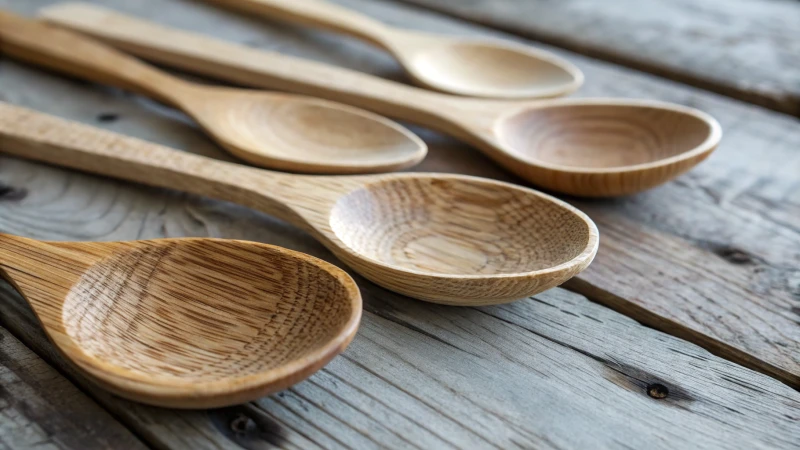
Understanding Material Quality
I remember choosing wooden spoons for a big family event. I wanted them to feel special. Material quality is very important. I look for spoons made from sustainably sourced wood, like birch and bamboo. These woods are strong and show care for our planet.
Checking for FSC certification is also really useful. This certification means the wood comes from well-managed forests, providing assurance that the product contributes to sustainable forest management practices.
Evaluating Design and Size Options
Next, I thought about design and size for different occasions. Different sizes suit different dishes:
| Spoon Type | Length | Use Case |
|---|---|---|
| Coffee Spoon | 5.5" | Stirring hot beverages |
| Dessert Spoon | 6" | Serving desserts |
| Dinner Spoon | 7" | Main meal service |
Exploring suppliers with customizable designs really excited me! Personal touches make weddings or business events feel more elegant and special.
Checking for Compostability
One major concern was the environmental impact of the spoons. I always check if the spoons are compostable at home or in commercial facilities. Many products claim to be compostable; I verify this by checking packaging or supplier details.
Choosing compostable spoons helps me meet my sustainability goals while promoting responsible waste management too. For those interested in compostable materials, checking out sustainable practices4 might be worthwhile.
Assessing Durability
Durability often worries me, especially with hot dishes. High-quality wooden spoons should handle heat without changing shape. When checking durability, I look at:
- Thickness: Thicker spoons are usually stronger.
- Texture: A smooth surface shows good craftsmanship and prevents splinters.
Looking for Non-Toxic Materials
Wooden cutlery is naturally non-toxic. Unlike plastic utensils, they don't have harmful chemicals like BPA. I always confirm with my supplier that the products are free from toxic substances to ensure safe food consumption.
This is really important for anyone in the food service industry, where health standards are crucial. For more on safe materials, look into eco-friendly materials.
Exploring Aesthetic Appeal
Now, let's talk about looks! Wooden spoons bring a rustic charm to dining experiences while being eco-friendly options that can also be very beautiful.
I enjoy exploring unique designs or finishes that could enhance the mood of an event while staying sustainable. For some style tips, explore event planning essentials.
Sustainably sourced wood enhances spoon quality.True
Using sustainably sourced wood like birch or bamboo ensures high-quality and eco-friendly disposable wooden spoons.
All wooden spoons are automatically compostable.False
Not all wooden spoons are compostable; check packaging for verification before disposal to ensure environmental safety.
Where can I find reliable suppliers for eco-friendly wooden utensils?
Finding your way through eco-friendly wooden utensils may feel confusing. I have experienced that. Here are some thoughts and resources. These will help you discover reliable suppliers. These suppliers truly focus on sustainability.
To find reliable suppliers for eco-friendly wooden utensils, explore online marketplaces. Alibaba and Etsy offer many options. Attend industry trade shows for direct meetings with suppliers. Network with groups focused on sustainability. Research and connect within these communities. Look for certified suppliers. Strong product quality matters a lot. Customization options are essential. Your choice should match eco-friendly values.
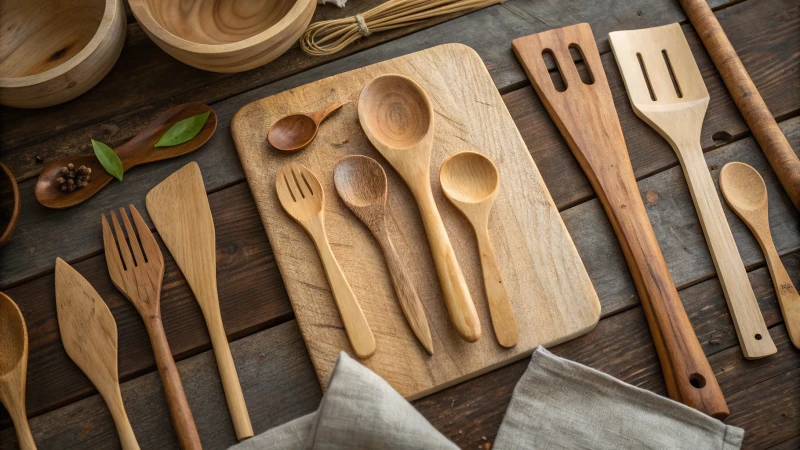
Understanding the Market for Eco-Friendly Wooden Utensils
Finding trustworthy suppliers for eco-friendly wooden utensils feels like searching for treasure. It's rewarding, yet sometimes difficult. I recall my first attempt to source sustainable kitchenware. Excitement mixed with anxiety filled me. Would I find vendors truly aligned with my values? Over time, I discovered one truth: understanding the market is really important. The demand for sustainable products grows. Many options exist, but not all suppliers meet expectations.
Learning about certifications was an eye-opener for me. Certifications like the Forest Stewardship Council (FSC)5 assure us the wood comes from responsibly managed forests. This is vital for supporting sustainable choices.
Key Features to Look For
Some key features really matter when choosing suppliers. Each feature influences my decision and ensures they resonate with my eco-friendly values.
| Feature | Importance |
|---|---|
| Material Quality | Ensure the wood is sustainably sourced. |
| Certifications | Look for FSC or similar certifications. |
| Customization | Check if suppliers offer customizable options for branding. |
| Compostability | Verify if products are compostable, enhancing sustainability. |
Where to Find Suppliers
-
Online Marketplaces
-
Industry Trade Shows
- Attending trade shows focused on sustainability opened many doors for me. Events like the Sustainable Food Summit7 are excellent opportunities. They provide chances to connect directly with suppliers and examine products firsthand.
-
Networking with Industry Peers
- Forums or groups on platforms, like LinkedIn, are incredibly helpful. I gained valuable recommendations from professionals who share my passion for sustainability.
Evaluating Supplier Reliability
Requesting samples is a crucial tip. This practice allowed me to judge product quality directly and gave me confidence in my investments. I also asked for references or client testimonials. These insights helped me understand their reliability in supply and customer service.
Conclusion
Finding reliable suppliers for eco-friendly wooden utensils involves thorough research, networking and evaluating key product features. Using available resources and connecting with professionals helped align my choices with sustainability goals. Remember, every small step towards responsible sourcing probably leads us to a greener future.
FSC certification guarantees sustainable wood sourcing.True
The Forest Stewardship Council (FSC) certifies that wood comes from responsibly managed forests, ensuring sustainability.
Online marketplaces are the best source for eco-friendly utensils.False
While online marketplaces offer options, trade shows and networking are also valuable for finding reliable suppliers.
Are there any health concerns associated with using wooden cutlery?
Wondering if wooden cutlery is safe? I understand that feeling! Let's explore the possible health risks of these environmentally-friendly utensils. Are they truly as good as traditional ones? Maybe.
Wooden cutlery is usually safe for health because it has natural antibacterial qualities. But users need to take care of it well to stop bacteria from growing. It is very important to clean and dry wooden cutlery regularly. Hygiene depends on proper cleaning.
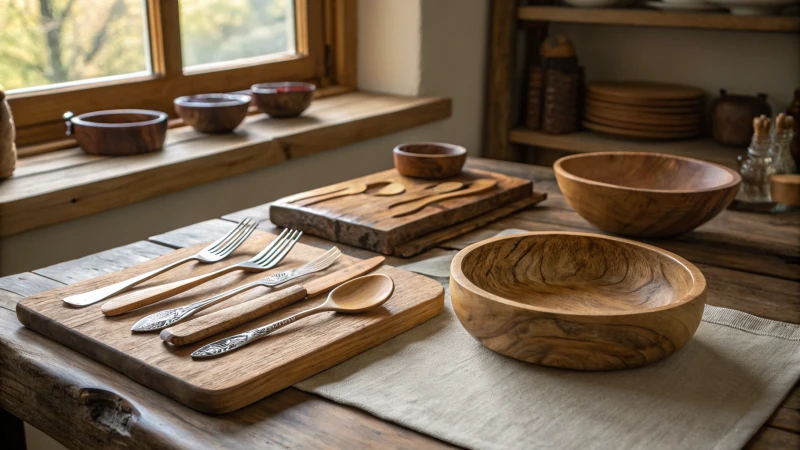
Understanding the Safety of Wooden Cutlery
When considering the transition from plastic to wooden cutlery, health safety is a paramount concern. Many people worry about the potential for wooden utensils to harbor bacteria, especially when used in food preparation and service. However, wooden utensils actually possess natural properties that can make them a safer option compared to plastic.
Natural Antibacterial Properties
One of the standout features of wooden cutlery is its inherent antibacterial qualities. The structure of wood makes it less hospitable for bacterial growth compared to plastic, which can retain moisture and bacteria on its surface. This property helps in maintaining hygiene standards when using wooden spoons8. Studies have shown that wood can inhibit the growth of various bacteria, making it a reliable choice for food service.
Comparing Health Risks
| Material Type | Bacteria Growth Rate | Safety Concerns | Common Usage |
|---|---|---|---|
| Wooden | Low | Minimal if properly cared for | Food service, cooking |
| Plastic | High | Chemicals leaching, BPA | Disposable cutlery, food packaging |
While wooden utensils are generally safe, improper care can lead to issues. It’s crucial to wash and dry wooden cutlery thoroughly to prevent moisture accumulation.
Hygiene Practices for Wooden Cutlery
To maximize the health benefits of using wooden cutlery, consider implementing these practices:
- Regular Cleaning: Always wash wooden cutlery with hot soapy water and avoid soaking them.
- Dry Immediately: After washing, dry them immediately to prevent warping and bacterial growth.
- Periodic Oil Treatment: Treating wooden utensils with food-safe mineral oil can help maintain their integrity and prevent cracking, which may harbor bacteria.
- Avoid Cross-Contamination: Use separate wooden utensils for raw and cooked foods to reduce the risk of cross-contamination.
These simple hygiene practices can ensure that your wooden cutlery remains safe and effective for use in food preparation and service.
Potential Drawbacks of Wooden Cutlery
Despite the advantages, there are some potential drawbacks to using wooden cutlery that users should be aware of:
- Durability: While high-quality wooden spoons are sturdy, they can still break or splinter if not handled properly.
- Limited Heat Resistance: Some types of wood may not withstand very high temperatures, making them less suitable for certain cooking methods compared to metal utensils.
- Absorption of Flavors: Wooden utensils can absorb strong flavors or odors over time, which may affect the taste of food prepared with them.
By understanding these considerations, consumers can make informed decisions about incorporating wooden cutlery into their kitchens without compromising their health.
For further insights on maintaining hygiene with wooden utensils, explore our detailed guide on caring for wooden kitchenware9.
Wooden cutlery has natural antibacterial properties.True
Wooden utensils inhibit bacterial growth, making them safer than plastic options in food service when properly maintained.
Improper care of wooden cutlery can lead to health risks.True
Failure to clean and dry wooden utensils can allow bacteria to thrive, posing potential health concerns.
Conclusion
Explore the advantages of eco-friendly wooden spoons over plastic, including sustainability, safety, and aesthetics. Find tips for selecting quality products and trustworthy suppliers.
-
Explore the environmental impact of using wooden vs plastic utensils and understand the importance of sustainability. ↩
-
Learn about the health implications of using wooden cutlery instead of plastic for food preparation. ↩
-
See how wooden utensils can enhance the dining experience aesthetically and functionally. ↩
-
Discover essential tips for selecting durable and eco-friendly disposable wooden spoons that meet your needs and standards. ↩
-
Explore this link to discover top-rated suppliers who specialize in eco-friendly wooden utensils, ensuring you make sustainable choices for your business. ↩
-
This resource provides a comprehensive list of sustainable utensil manufacturers, helping you find trustworthy partners for your eco-friendly initiatives. ↩
-
Learn about upcoming trade shows focusing on eco-friendly products, where you can connect directly with suppliers in the industry. ↩
-
Clicking this link will provide you with additional insights into the benefits and safety of using wooden utensils in your kitchen. ↩
-
This link offers comprehensive information about how to maintain hygiene when using wooden kitchenware effectively. ↩

